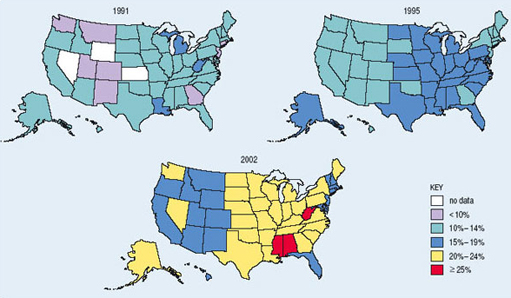2.5 Obesity and ageing
So, it seems that a part of the explanation for Ron's obesity, and the health problems that have led him to seek medical advice, may relate to the environment in which he is living, and more specifically the diet that he has chosen. It may also be a diet that is especially effective in activating the reward circuits in Ron's brain. However, Ron is also in his later middle age. A longitudinal study of people of this age in the USA suggests that average body weight increases by 1–2 kg per decade in later middle age (He and Baker, 2004).
Activity 26
Is this observed weight increase necessarily a consequence of age? What other explanation can you suggest?
Answer
This observation of increased average body weight might not represent an effect of age – instead it might have resulted from a change in the typical diets of this group of Americans over the 10 year period of the study -perhaps the participants were eating more energy-dense, high-fat food at the end of the study period than at the beginning because of cultural changes within the society within which they lived. As previously mentioned, there may have been changes to the way that the food they were eating has been processed, such as the increased use of corn syrup as a sweetener. This could lead to an altered total energy intake occurring without the participants making any obvious changes to their diets.
It certainly is the case that obesity has increased very markedly in both USA (Figure 10) and Europe during the last 20 years, and this applies to young as well as older people.

However, it is also possible that the increase in Ron's weight is due to age-related changes in his behaviour or physiology. Remember that changes in body weight can only occur when energy intake and output differ. There are several reasons why energy expenditure might decrease as we age.
Activity 27
What suggestions can you make?
Answer
There may be a tendency to exercise less frequently and intensely.
In addition, some of the hormonal changes associated with ageing may tend to reduce basal metabolic rate. For example, the levels of gonadal steroids, including androgens such as testosterone, decrease substantially. Amongst its many effects, testosterone tends to increase metabolic rate and promote production of muscle rather than adipose tissue. So, even in individuals eating the same diet over the period of a decade, there might be a tendency for body weight to increase if food consumption does not drop.
